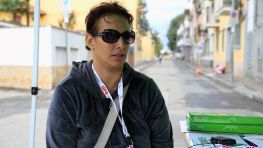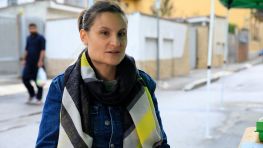 Elisa Di Tullio
Elisa Di Tullio Angela Maccagnola
The culture of breastfeeding.
Angela Maccagnola, obstetrician at the Ospedale Maggiore in Novara since 1989, wanted to take care of the birth and care of the children. Breastfeeding in particular is an issue that is particularly dear to her and has long been overlooked and underestimated by the National Health System.
In the eighties and nineties, it was realized that the use of infant formula had been excessively pushed and, starting from this reflection, it was decided to promote and encourage natural breastfeeding, the benefits of which have important repercussions both on the health level, and on the emotional, social and economic one. Angela emphasizes the need to structure, within the care path that accompanies every woman from pregnancy to the care of the newborn in the first months of life, very close relationships and a constant listening to the requests of each mother.
To foster this relationship, it would be necessary to assign to each mother a stable and defined group of health workers, medical and non-medical, in order to establish a relationship that is as stable as possible between future mothers and those who provide assistance. Furthermore, Angela underlines the importance of reconstructing a breastfeeding culture that not only pervades and involves healthcare personnel at all levels, but which becomes a sort of substratum on which each mother can lean once back home.
Video table of contents
- Midwife in Novara since 1989.
- Breastfeeding was an issue that was often overlooked by public health until the 1980s and 1990s.
- The effects of breastfeeding on short- and long-term health.
- I chose to be a midwife since I was a child, the first years.
- Listen to the intentions of the mothers to set up a shared path.
- The culture of breastfeeding is something that has to start from afar not only in the period of pregnancy.
- Fear of pain in childbirth and breastfeeding.
- The fragmentation of skills in the mother's care path and the lack of a practical approach.
- Breastfeeding is underestimated: childbirth is a day, breastfeeding is a long journey.
- To better enjoy the experience of motherhood, it is necessary to find continuity in the care pathway and accompany mothers throughout the process.
- Mothers should be an active part of the journey.
- Breastfeeding support works and it is important to involve the whole family.
- The role of the other parent and the importance of being prepared.
- The rhythms and times of breastfeeding are not marked, they are the rhythms of the newborn.
- 1990s: Health systems change and begin to perceive the need for support for breastfeeding.
- Milk as an element of care.
- Breast milk to treat breast fissures.
Interview information
Country: IT
Region: Piemonte
City: Novara
Angela Maccagnola
Date of birth: 04-03-1968
City: Novara
School: University
Profession: Other
Languages: Italiano
Document by: Luca Ghiardo
Video by: Luca Ghiardo, Davide Porporato
Created: 14-09-2022
Questo video fa parte del seguente archivio
Breastfeeding: forms and practices of humanity
Breastfeeding: forms and practices of humanity
Breastfeeding is unanimously recognized by the main world health authorities as a fundamental health protection in the short, medium and long term for both the baby and the mother, offering biological, nutritional, emotional, relational and economic benefits.
The most important international scientific societies recommend giving the baby only breast milk for the first six months of life and subsequently accompanying the introduction of other foods with breastfeeding at least for the entire first year of the baby's life, but also up to two years and over if mother and child so wish.
This archive contains some testimonies of mothers and midwives aimed at deepening this theme by offering points of view anchored to individual experiences and sensitivities.






